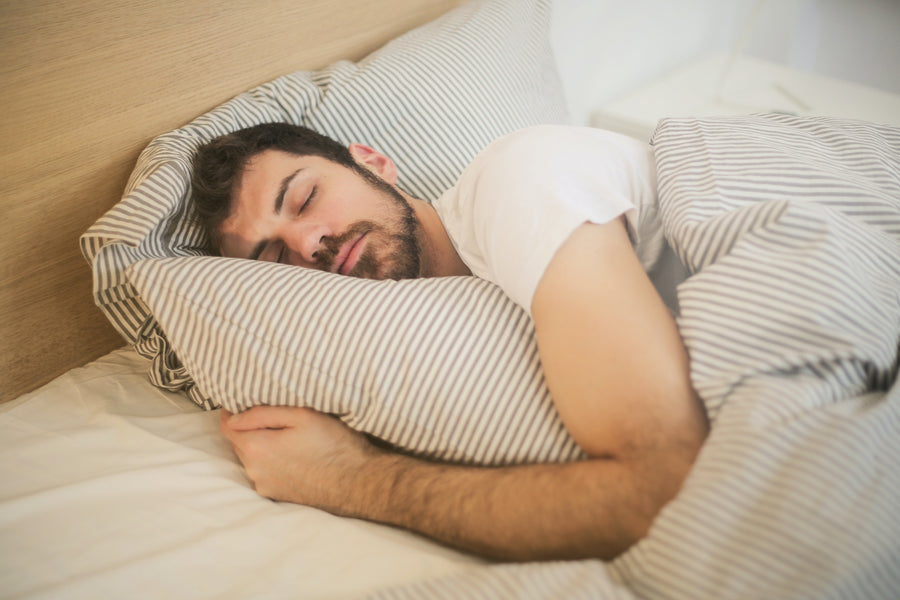
Header Photo by Andrea Piacquadio from Pexels
We all love a good night’s sleep, don’t we? Ask anyone what is something they want after a long day at work, and most of the answers would be a good night’s sleep. In fact, it’s just as important as eating and exercising. If you want to live a healthy life, then resting should be an important priority.
But unfortunately, getting a good and timely sleep does not come as easy these days. A lot of factors, natural and external have interfered with our sleeping patterns. Natural factors such as stress, illness, insufficient exercise and external factors such as consuming substances including alcohol, tobacco, nicotine, caffeine and some medications can affect our sleeping patterns in a big way.
Nowadays, people sleep less than they did in the past, and the quality of sleep is on the decline. This is becoming a major challenge as it directly impacts our health and interferes with our daily routines. You will not be able to perform at your best throughout the day if you are sleep deprived.
How Much Sleep Do We Need a Night?
Sleep requirements can vary from one person to another. This again depends on various factors, some of which include the food that you eat, the work you do in your day, your age, gender and even location. But on average, experts recommend that a healthy adult should sleep between seven to nine hours every night.
The sleep should preferably be at one stretch without any disturbances. It is only when you get quality sleep at night that you can function at your best during the day. Children and teens on the other hand require even more sleep. Experts recommend that teens should have an 8 to 10-hour sleep schedule and children below 8 should sleep about 9 to 11 hours. To allow their body and mind to get enough rest and develop properly.
It’s also suggested that if you are not able to completely get the required sleep at night, then you should take daytime naps to fill in the gaps. Although not as good as a perfect night’s sleep, these too can help you recharge yourself and have enough energy for the rest of the day.
What Problems are Associated with Lack Of Sleep?
Lack of proper sleep can result in various health issues for the body. If you are sleep deprived consistently, then the problems can surmount and can develop into chronic disease. It can also have an impact on the quality of your life, as you will struggle to last through the day, concentrate on tasks and remain frustrated and irritated most times.
Increase in Weight
Short sleep is directly linked to an increase in the risk of gaining weight and becoming obese, as found in these studies. Additionally, an extensive review was even able to quantify the risk, stating that children who are sleep deprived are up to 89% more likely to be overweight, while the risk was measured at 55% for adults.
Increased Risk of Heart Diseases and Stroke
Research has found that people having consistent sleep deprivation are more prone to having heart diseases and strokes. The risk was considered to be far higher in comparison with those who regularly get 7 to 8 hours of uninterrupted sleep every night.
Increased Risk of Type 2 Diabetes
Sleeping less than 7 to 8 hours a night can also have an impact on your blood sugar and insulin sensitivity. In a recent study conducted on a few healthy men, it was concluded that those who restricted their sleep to 5 or 6 hours per day developed more symptoms of being prediabetic. Additionally, it has been repeatedly observed over the years that people who sleep less than 6 hours a day are always at an increased risk of developing Type 2 Diabetes.
 Photo by Nathan Cowley from Pexels
Photo by Nathan Cowley from Pexels
Increased Risk of Depression
Poor sleeping patterns are often linked to mental illness, stress and even depression. It has been estimated that up to 90% of people already going through mental illnesses have issues in getting a sound and uninterrupted sleep.
Similarly, people who complain of insomnia or have sleeping disorders also report more symptoms of stress, anxiety and depression in comparison with those who can get enough sleep.
Increased Risk of Inflammation
Irregularity in sleeping patterns also has a direct link with cell damage and undesirable inflammation in the body. There is also reported evidence of inflammation of the digestive tract, known as inflammatory bowel disease due to poor sleep. Undesired inflammation is also a major cause of chronic diseases.
Change in Emotional and Social Life
If you do not get enough sleep, then you are likely to feel fatigued, irritated and frustrated. This impacts your social life and largely reduces your ability to socially interact with people.
Furthermore, it has been observed that people who have poor sleeping patterns or do not get enough sleep are unable to express their emotions freely, and they often struggle to interpret expressions of happiness and anger too. Eventually, it leads to an emotional struggle and makes it harder to cope up with life.
How can you Improve your Sleep Quality or Increase Your Sleeping Hours?
Seeing how important sleep is for your body and how dangerous lack of it can be, it is important for you to increase your sleeping hours, improve your sleep quality and get the required 7 to 9 hours of sleep at night. Easier said than done though, then how can you actually get that coveted “good night’s sleep”?
Make Yourself Tired
Keep yourself physically active throughout the day and exercise regularly, this will tire up your body and it will require a good rest to recharge itself. This allows you to get a good and uninterrupted sleep at night, allowing you to wake up in a good mental and physical state the next morning.
Besides, exercising also has a stimulatory effect and it increases the production of hormones such as epinephrine and adrenaline, which further improve the quality of your sleep.
Keep Off Screens at Night
We often find ourselves looking at our mobile, laptops, or television screens late in the night. Due to the advancement in technology and an increase in our dependence on these gadgets, we rarely stop looking at screens. This has an adverse effect on your sleep quality and patterns.

Photo by Andrea Piacquadio from Pexels
These screens emit blue light that tricks your brain into thinking that it is still daytime. You should try and not look at screens an hour before you want to go to bed. Additionally, you can turn on night light with yellowish tint on your devices or wear glasses that block blue light and not allow it to interfere with your sleep.
Say no to Caffeine, Alcohol and Tobacco
While caffeine may have multiple benefits, consuming it at night can stimulate your nervous system and stop your body from relaxing at night. Similarly consuming alcohol at night can alter your melatonin production, which is the key hormone that has the role of maintaining the body's circadian rhythm. Additionally, alcohol and tobacco are known to increase the symptoms of sleep apnea, snoring and other sleep-related disorders.
Get Comfortable
You need to have a comforting and relaxing atmosphere around you to enable your body to get into a state of relaxation and with it cause better sleep. You should keep your room temperature around 70 degrees Fahrenheit, which is neither too warm nor too cold. Similarly, you should ensure that you have a comfortable bed and mattress where you can feel cozy, ensure there isn’t much light in the room and the noise levels are nil to low.
You can also fix a time for sleeping and getting up. While it may seem challenging at first, with a perfect room atmosphere and consistent effort, you will get used to it pretty quickly and get yourself sufficient sleep in a fixed pattern every day.
Keep a Relaxed and Clear Mind
Stress is a major factor that affects sleep quality. If you are looking to get a good night’s sleep, then you should try and have a clear mind at night. You should leave your work, social life and other life problems behind and focus fully on your sleep. Moreover, you can have a relaxing massage, meditate, take a hot shower, read a comforting book, or hear inducing and relaxing music to calm your senses and relax through the night.
Drink More Water!
You read that correctly.
How Does Drinking More Water Allow You To Get a Better Night’s Sleep?
Penn State University in Pennsylvania recently conducted a study to understand the relationship between water and sleep. The study, carried out on 20,000 people, found that people who slept for just 6 hours at night had more levels of concentrated urine and were more dehydrated in comparison to those who had 8 hours of sleep every night.
The connection between water and quality sleep is multi-faceted. But primarily, not drinking enough water leads to dehydration, and that can have a significant impact on your sleep. Dehydration can cause problems such as nighttime leg cramps that may not allow you to sleep peacefully. Dry up your nasal passage that can lead to snoring and interrupted sleep that can lead to high blood pressure as your blood vessels work hard to carry blood, causing trouble while sleeping.
Fortunately there’s some indicators that can help you notice if you are dehydrated and need to drink more water. A dark yellow/pale colored and foul-smelling urine, dryness of the skin and trouble in focusing are some of the most common indicators. You should ideally drink 2.3 oz water every day, but if you forget drinking water and notice any of these indicators, you should immediately drink more water and keep yourself hydrated.

In addition to this, you can also try Alkaline Water to keep yourself hydrated for longer periods. Alkaline Water gets absorbed by your cells quickly and is retained for much longer periods than regular water. Also, due to its high pH level, it brings additional benefits such as relief from heartburn, acid reflux and other gastrointestinal issues besides maintaining a good pH balance in your gut.
You can try out the DYLN Bottle, which creates alkaline water within minutes. You just need to fill it with regular water and the VitaBead Diffuser at the bottom of the bottle turns it into Alkaline Water within minutes. You can opt for the bottle that you prefer and then carry it wherever you go throughout the day, drink water regularly, keep yourself hydrated and with it be sure of getting a good night’s sleep!
Final Words
Sleep plays a key role in our lives. It is essential for the body, and we need to have enough of it daily for healthy living. Despite our grueling schedules, innumerable responsibilities and unnecessary addictions, we need to keep everything aside and focus on getting good quality sleep.
It is challenging for many, and a lot of us struggle to reach the minimum number of hours we need for good sleep and subsequently better health. However, there are many ways through which you can improve your sleep quality and patterns, and avoid the various risks associated with improper sleeping.
One such way of getting more sleep is to drink more water, which surprisingly for many directly linked with sleep quality. We can say that in addition to all the amazing benefits of drinking more water, you now have one more reason to remember to drink water throughout the day. Start churning up your hydration levels now and be rest assured of a good night’s sleep later.





